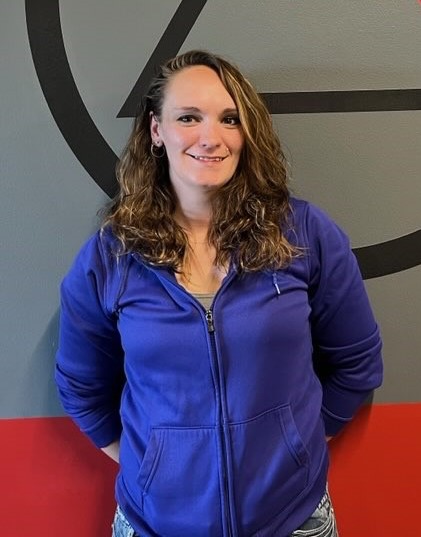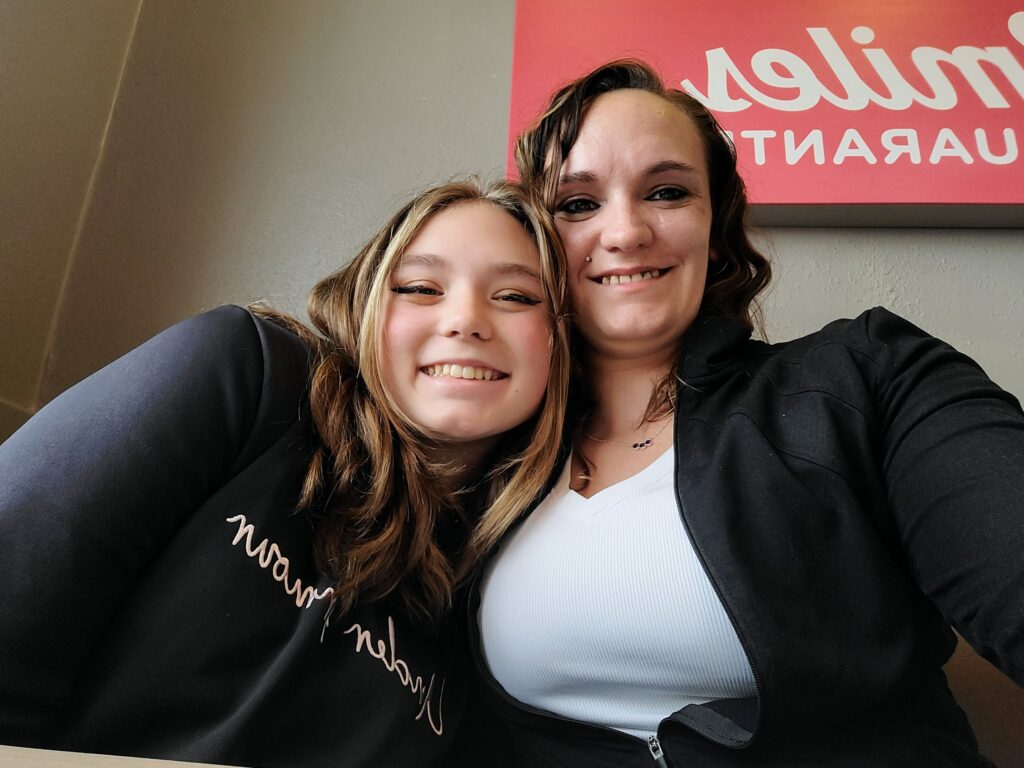Krystal Holmes, Ones Step At A Time

This month we spoke with Krystal Holmes about addiction and recovery. She came to CORE just over a year ago, and by working the 12 Step program Krystal has recovered. As we first sat down together, she chattered happily about her commencement at CORE, seeing her daughter and mother, getting her high school diploma, and her hopes for the future. When we asked about how she first became addicted, however, things got really serious, really quickly. We’re giving the Reader fair warning here, because her descent into the abyss is poignant and tragic (so take a deep breath!)
A sexual assault isn’t easy to talk about, much less repeated assaults, but Krystal shared her story with us precisely because it is her story. She told it calmly and directly, explaining how she as a girl of fourteen turned to alcohol and drugs. She never appeared to excuse her addiction – ever. She simply told us what happened, remembering a mouse of a girl who, having been discounted by the one person who might have stopped the abuse, felt too humiliated and disgraced to ask anyone else for help.
Thus, Krystal did not live what we would call a common childhood. A typical fourteen-year-old girl is into things like gossip and makeup, BFFs and social media. She will talk a lot on the phone, and listen to music. The world before her appears big, inviting, and flat-out exciting. When it comes to her future, the sky’s the limit. Krystal never really enjoyed these experiences and hopes.
Her social and emotional development more or less had stopped by the time she turned fifteen. By then, she lived in a cloud of numbness and detachment. Concentrating at school was next to impossible. While Krystal did physically walk the halls of her school, she wasn’t really there, not really. Krystal was distracted, continually reliving what had happened while simultaneously dreading what may come. She was afraid to go home after school. Whatever she was doing throughout the day, always lurking underneath was the fear of what might happen to her once she had crawled into bed at night.
This is not something that a child simply powers through or ignores. She started using almost from the beginning. Her poisons were alcohol and marijuana, and then methamphetamines. The escape they offered seemed irresistible. The step-dad finally got his comeuppance when another child victim spoke up, corroborating Krystal’s pleas for help. He ended up in prison, but that was small comfort for Krystal. She already thought of herself as defective, like something deep within her core was broken.
Over the next fifteen years, substance abuse pulverized her. There aren’t any happy highlights to share. They all relate to still more abuse, more drugs and alcohol, as well as arrests, homelessness, and children who were taken away. “I couldn’t even look at myself in the mirror,” she says, “I was degrading myself, my [secondary] motives were wrong.” In her own words, she was “just existing, doing whatever it took to get drugs and a roof over my head, on and on and on, for years.”
Finally, last year her boss at work advised her to come to CORE. Fear nearly derailed her. “I was afraid,” she recalls, “afraid of not making it [in the program], of going back out there, of being judged.” She overcame that fear, however, entered the program, and never looked back. At her recent commencement, Krystal bravely stood before the crowd of staff, clients, and families, but she directly addressed newcomers to the program, urging them “to put your faith over your fear, because by doing that, God will work wonders in your lives.” We think this reflects remarkable progress for this young woman, who came to us barely more than one year ago despairing of life itself.
She got involved in the recovery program almost immediately upon her arrival. Her most challenging part of the program was toward the beginning, at Steps 2 and 3. We don’t often hear about Step 3 being a challenge as it was for Krystal. The Step refers God “as we understood him.” Krystal, it turns out, really didn’t have an understanding of God:
“I’d never had a true father figure in my life, an earthly father, so I didn’t know how to conceive or how to go about having a heavenly father. I just didn’t have any reference to God as a father.”
Even today, her personal understanding of God “is still evolving and growing,” but she’s thankful for the women with whom she surrounded herself during her early days in the program. Their support and input were invaluable in helping her make an initial approach to God. Thus, by “Day 33” at CORE, she already had begun writing on her 4th Step.
She now considers her relationship with God to be central to her recovery. She reads her Recovery Bible (“I try to study it the best I can“), and she also prays. The most important thing to her, however, is that she tries to live in accordance with God’s will. She says, “I’m trying. Am I perfect? No — but I’m really trying!”
Having a relationship with God also promotes her confidence and self-esteem. In the past Krystal thought that either winning the approval of others, or getting some particular thing, would make her feel loved and give her happiness. “Life isn’t like that,” she’s discovered, “but there is comfort knowing I’m trying to do what God wants me to do. There is peace in that, and nobody can ever take that away.”
Happily, her recovery has allowed Krystal to start building a new life. Many good things already are happening. As an example, her commencement was attended by her daughter, whom she hadn’t seen in eight years. They met Krystal’s mother before the ceremony, the first time grandmother and granddaughter had ever met. Krystal has reached out to other loved ones, too. She hopes and prays that she can have a positive impact in their lives and strengthen those relationships.

In many respects, Krystal is going back to the beginning and rebuilding step by step. She recently passed the HiSET test and received her high school diploma. She began studying for it only last November, and passed with solid marks. While she is content at her present job, she’s seriously considering furthering her education. Does she already have a college major in mind? “I’m not sure yet,” she tells us, “I’d like to learn about psychology, all about the mind. Maybe become a clinical psychologist.”
Of CORE, Krystal says “I think God brought me to CORE, which gave me the stepping stones to Him. It also helped me get back on my feet. CORE also has helped me let go of what was.” For now, she’s content to help newcomers and to make herself available to talk, provide support, and give guidance about 12 Step work. She wouldn’t mind managing a CORE house in the future. Before that happens, she foresees “a lot of growth” in herself and says there are still things she wants to work on.
We at CORE are very happy for Krystal, and we see many positive things happening for her in the future. She is welcome to stay and mature in her knowledge and understanding of God. Her life will continue to evolve at CORE; she will undertake a more meaningful role the further she goes in recovery. Watching the newcomers around her grow, to see them help others, and watch the circle of women grow up about her – these are among the wonderful things she’ll want to experience!
